Table of Contents
Staying up all night or pulling an all-nighter can be necessary if you have work, study, or social commitments. However, have you ever wondered about the risks of skipping a night’s sleep?
Research suggests that a single night of sleep deprivation can impair cognitive function and increase the risk of accidents (1).
A single sleepless night is unlikely to be fatal in healthy individuals. However, people with heart conditions, sleep apnea, or neurological disorders should be especially cautious about skipping sleep (2, 3). Lack of sleep can worsen existing symptoms and even increase the risk of serious complications.
Read on to learn about the potential risks of staying up all night and discover whether pulling an all-nighter can, in fact, be fatal.
All-nighters and fatal risks: Who needs to be extra careful?
People with existing health conditions and shift workers are at a higher risk of experiencing severe complications because of sleep deprivation.
Sleep deprivation disrupts the body’s emotional, physical, and psychological balance, increasing the risk of serious health events. Here’s a closer look at the risks associated with pulling an all-nighter.
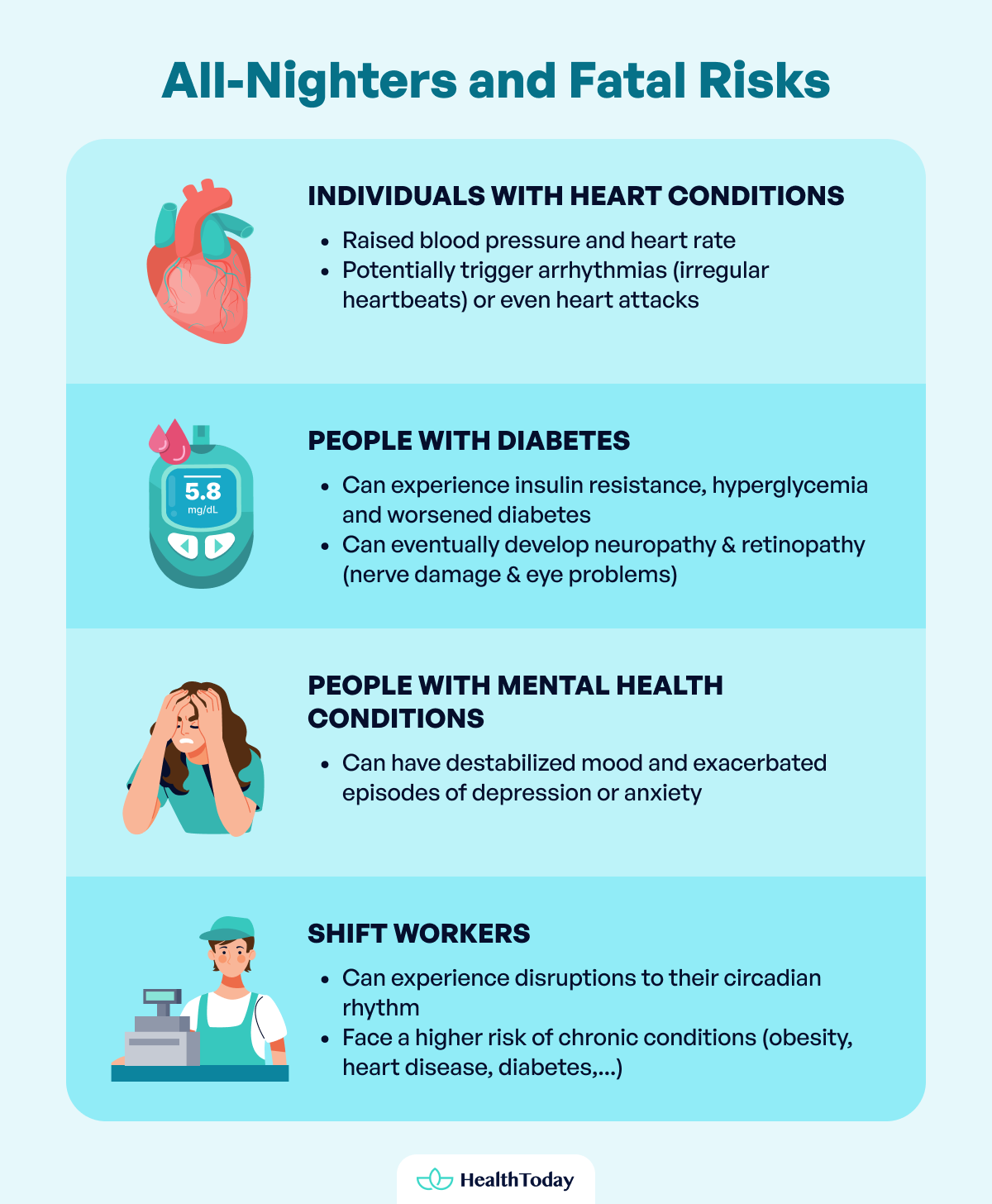
Individuals with heart conditions
When sleep-deprived, the body releases stress hormones, which can cause a rise in blood pressure and heart rate (2, 4, 5). Increased cardiovascular strain can trigger arrhythmias (irregular heartbeats) or, in severe cases, even heart attacks (6, 7).
People with diabetes
Sleep deprivation disrupts the body’s ability to secrete and use insulin appropriately to regulate blood sugar levels, leading to insulin resistance (8). When your body becomes less responsive to insulin, blood sugar levels increase, resulting in hyperglycemia and increased risk or worsening of diabetes.
Over time, chronic hyperglycemia in diabetes can lead to complications like nerve damage (neuropathy) or eye problems (retinopathy) (9).
People with mental health conditions
Lack of sleep can destabilize mood, increase feelings of irritability, and lead to more frequent and severe episodes of depression or anxiety (3).
Shift workers
Shift workers can experience disruptions to their circadian rhythm (the body’s natural 24-hour sleep-wake cycle), leading to cumulative negative health effects (10). Over time, shift workers face a higher risk of chronic conditions like obesity, heart disease, diabetes, and metabolic disorders due to disrupted sleep affecting hormone regulation (10).
What happens if you stay up all night regularly: Side effects
Frequent sleep deprivation can have a domino effect on your physical and mental well-being. A lack of sleep can lead to digestive issues, skin concerns, cognitive impairment, a weakened immune system, and a dysregulated metabolism.
Here’s a breakdown of some potential consequences.
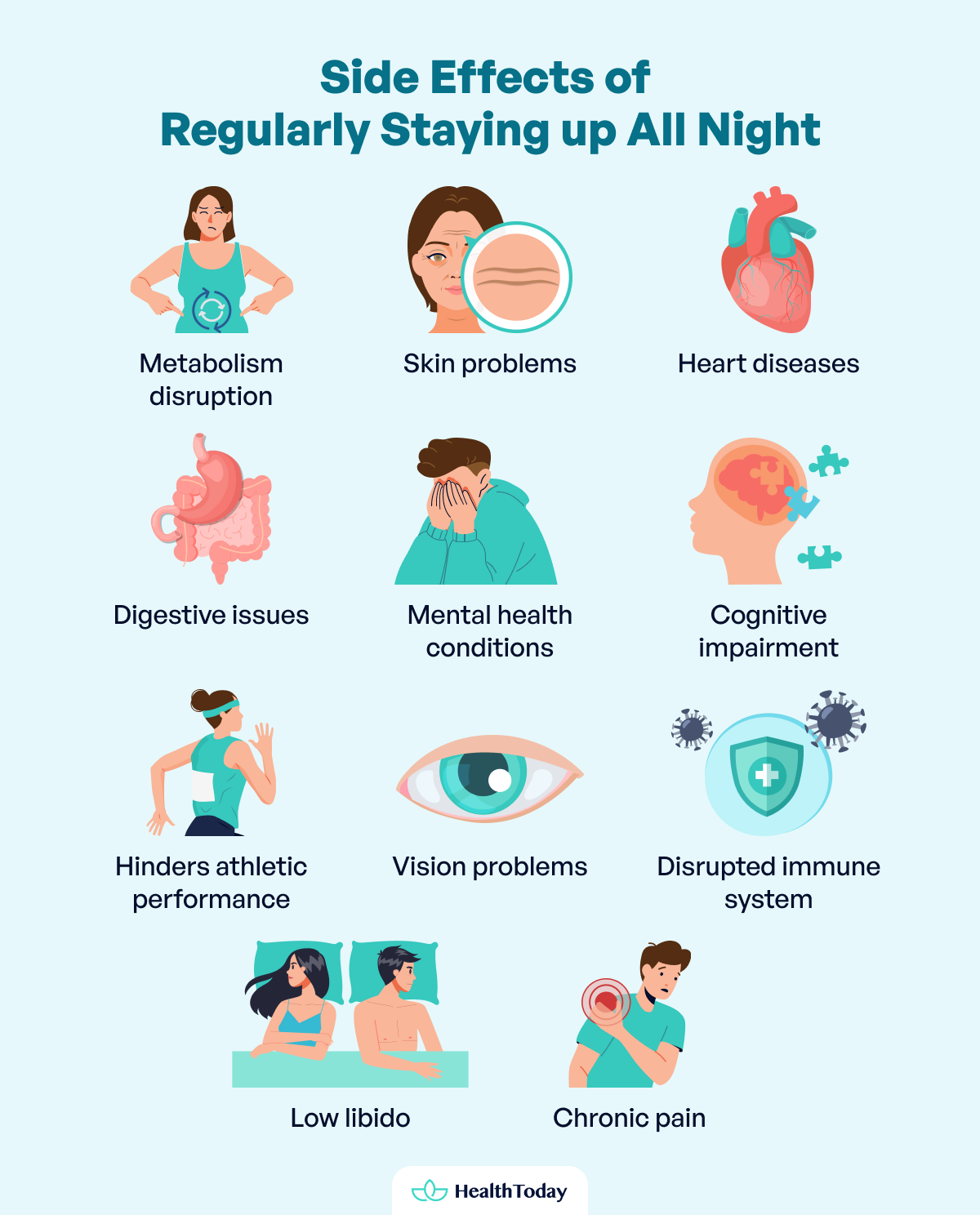
Metabolism disruption
Sleep regulates the production of leptin (satiety hormone) and ghrelin (hunger hormone) (8).
A lack of sleep decreases leptin levels and increases ghrelin levels. This imbalance disrupts your appetite cues, making you crave high-calorie, sugary foods that quickly boost energy but lack essential nutrients.
When sleep-deprived, your body becomes less sensitive to insulin, leading to higher blood sugar levels (8). This not only increases the risk of developing type 2 diabetes, but also impairs your body’s ability to use glucose effectively for energy.
This results in a vicious cycle in which your body continues to send hunger signals, further promoting unhealthy eating habits and weight gain.
Skin problems
Studies have shown that sleep loss can worsen skin tone by increasing facial skin yellowness (11). Sleep deprivation also disrupts the skin’s natural barrier function, leading to increased water loss and dehydration (12). Dehydration contributes to a dull appearance and worsens the signs of aging, like wrinkles and sagging.
On a deeper level, lack of sleep triggers the release of stress hormones and inflammatory chemicals that break down collagen, the protein responsible for skin elasticity and firmness (12). Chronic inflammatory skin conditions, like eczema and psoriasis, worsen because of poor sleep.
Heart diseases
When sleep-deprived, the body releases stress hormones like cortisol, leading to a rise in blood pressure and heart rate (13).
A study found that patients diagnosed with sleep deprivation were more likely to have hypertensive heart disease, suggesting that poor sleep can contribute to the development of cardiovascular issues (14).
Digestive issues
An imbalanced digestive system can trigger a series of digestive issues, causing constipation, diarrhea, bloating, and even heartburn (15).
Sleep deprivation also disrupts the production of hormones, like ghrelin and leptin, which regulate how food moves through our digestive system. This can lead to sluggish digestion and increased discomfort.
Mental health conditions
Adequate sleep is crucial for maintaining good mental health. When sleep-deprived, the amygdala, a part of the brain responsible for processing emotions, becomes hyperactive (16, 17).
This can make it difficult to manage your emotions, leading to increased irritability and a higher risk of developing anxiety and depression (3).

Cognitive impairment
During sleep, the brain consolidates memories, processes information from the day, and strengthens the neural connections that underlie learning and memory (18).
This offline processing period is vital for both cognitive function and creative thinking.
Experiencing sleep deprivation may lead to difficulty focusing, concentrating, and making decisions (16). Additionally, your ability to think creatively, solve problems, and develop new ideas can become impaired. Sleep loss makes your brain less flexible, hindering its ability to perform at its peak.
Hinders athletic performance
Athletes put their bodies under a lot of stress during training. Enough sleep is vital for them to recover and perform at their best. A study found that athletes who reported getting at least eight hours of sleep reported higher energy levels and were less likely to get injured or sick (19).
This is likely because good sleep strengthens the immune system and helps with muscle repair, suggesting that getting enough sleep is an important part of an athlete’s training routine (20, 21).
Vision problems
A lack of sleep decreases tear production, leading to dry, irritated eyes (22). In addition, sleep deprivation can affect the muscles that control eye movement, resulting in blurred vision and difficulty maintaining focus (23, 24).
Disrupted immune system
Studies suggest that chronic sleep deprivation might be linked to an increased susceptibility to certain immune-related disorders (25). During sleep, the body produces cytokines, molecules that help regulate the immune response (25).
A lack of sleep disrupts the production of these molecules, weakening the body’s capacity to fight infections or maintain a healthy balance in the immune system.
This imbalance can contribute to the development of autoimmune diseases, like rheumatoid arthritis, or neurodegenerative diseases, like Alzheimer’s (25).
Low libido
Sleep deprivation disrupts hormone production and affects neurotransmitters involved in sexual function. In men, sleep deprivation can decrease testosterone levels, a hormone responsible for sex drive and erectile function (26). Women may experience decreased sexual desire, arousal difficulties, and problems reaching orgasm (27).
Chronic pain
Sleep disturbances can worsen pain perception, and chronic pain can disrupt sleep patterns, creating a vicious cycle (28). Prioritizing adequate sleep can help manage chronic pain and improve sleep quality. This can break this cycle and promote overall well-being.






How long does the body take to fully recover from one sleepless night?
Generally, it takes one to two days to fully recover from a sleepless night (29). Signs your body is recovering from lack of sleep include:
- Feeling more alert and energized
- Improved concentration
- Better emotional regulation
Can an all-nighter lead to temporary insanity?
There’s no evidence that an all-nighter can cause temporary insanity. However, severe sleep deprivation can cause mental distress, especially in individuals who already have mental health problems (30).
Can sleep deprivation lead to drug abuse?
Sleep deprivation can increase the risk of drug abuse. A lack of sleep can make people more susceptible to seeking substances that provide temporary relief or stimulation. This can lead to the use of stimulants like caffeine to stay awake and function or depressants like alcohol to cope with the emotional toll of sleep loss (31, 32).
Studies also suggest that sleep disturbances, like those caused by sleep deprivation, can lead to opioid overuse and dependence (33).
Sleep loss increases pain perception and worsens existing pain. Individuals may turn to opioids for pain relief and in an attempt to improve their sleep (33).
However, chronic opioid use can further disrupt sleep patterns, creating a vicious cycle that can be difficult to break.
Regularly staying up all night alters hunger hormones, leading to increased cravings for unhealthy foods and raising the risk of type 2 diabetes.
Sleep loss can also lead to dehydrated and inflamed skin, accelerating aging and worsening conditions like eczema. A lack of sleep increases stress hormones, blood pressure, and heart rate, leading to heart disease.
You might also experience digestive issues like constipation and bloating. Sleep deprivation can also make you more irritable and prone to anxiety and depression.
It can also be difficult to focus, concentrate, and make decisions. Vision problems, like dry eyes and blurred vision, arise from reduced tear production. Libido decreases because of hormonal disruptions, and chronic pain becomes more intense and harder to manage.
How to stay awake after an all-nighter
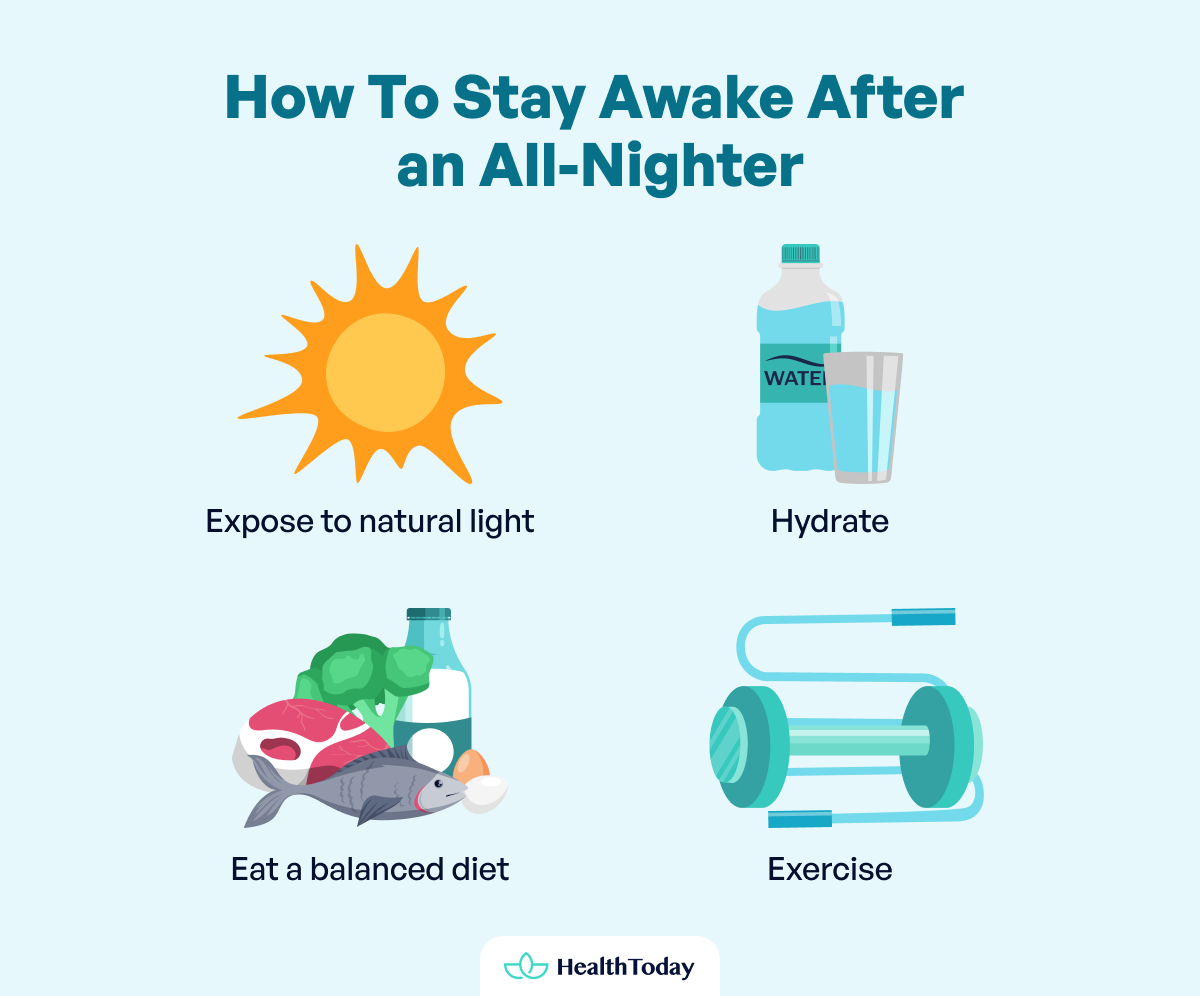

Light exposure, hydration, light exercise, and a balanced diet are some ways to keep you functional after a sleepless night. These strategies help you fight fatigue and keep you going throughout the day.
- Expose yourself to natural light: Bright light helps reset your internal clock and keeps you alert. Exposure to natural light can help regulate your circadian rhythm and improve alertness (34).
- Hydrate: Drinking water can help combat fatigue (35). Dehydration can worsen tiredness while staying hydrated can maintain energy levels.
- Eat a balanced diet: Eat small, frequent meals with proteins and complex carbohydrates. Foods rich in protein and fiber can provide sustained energy and prevent blood sugar spikes and crashes.
- Exercise: Light exercise can boost your energy levels (36). Activities like stretching, walking, or light aerobics can increase blood flow and oxygenation, helping you stay alert.
How to recover after an all-nighter
Getting a full night’s sleep is always the best remedy for an all-nighter. However, there are other steps you can take to help your body and mind recover and get back on track.
Napping
A 20 to 30-minute nap can help improve mood, performance, and alertness without causing grogginess (37).
Sleep hygiene
Establish a regular sleep schedule and create a restful environment. Consistent bedtimes, a cool and dark room, and limiting screen time before bed can improve sleep quality (38).
Healthy diet
Studies suggest that meals rich in protein, carbohydrates, and healthy fats improve sleep quality (39). Similarly, omega-3 fatty acids may regulate serotonin, helping you get restful sleep. Consuming complex carbohydrates with a low glycemic index and high fiber content promotes sustained energy and helps regulate blood sugar levels, leading to a more stable sleep cycle.
Exercise
Regular exercise helps us fall asleep faster, sleep more soundly, and wake up feeling more refreshed (40). In addition, physical activity promotes melatonin production and reduces stress, a common barrier to sleep. Studies have shown that even moderate-intensity exercise for 30 minutes three times a week can significantly improve sleep quality in people with insomnia (40).
What should you avoid when you are sleep-deprived?
Sleep deprivation impairs your physical and mental abilities, making certain activities downright dangerous. Here are some activities to avoid when you’re suffering from sleep deprivation to ensure your safety and well-being.
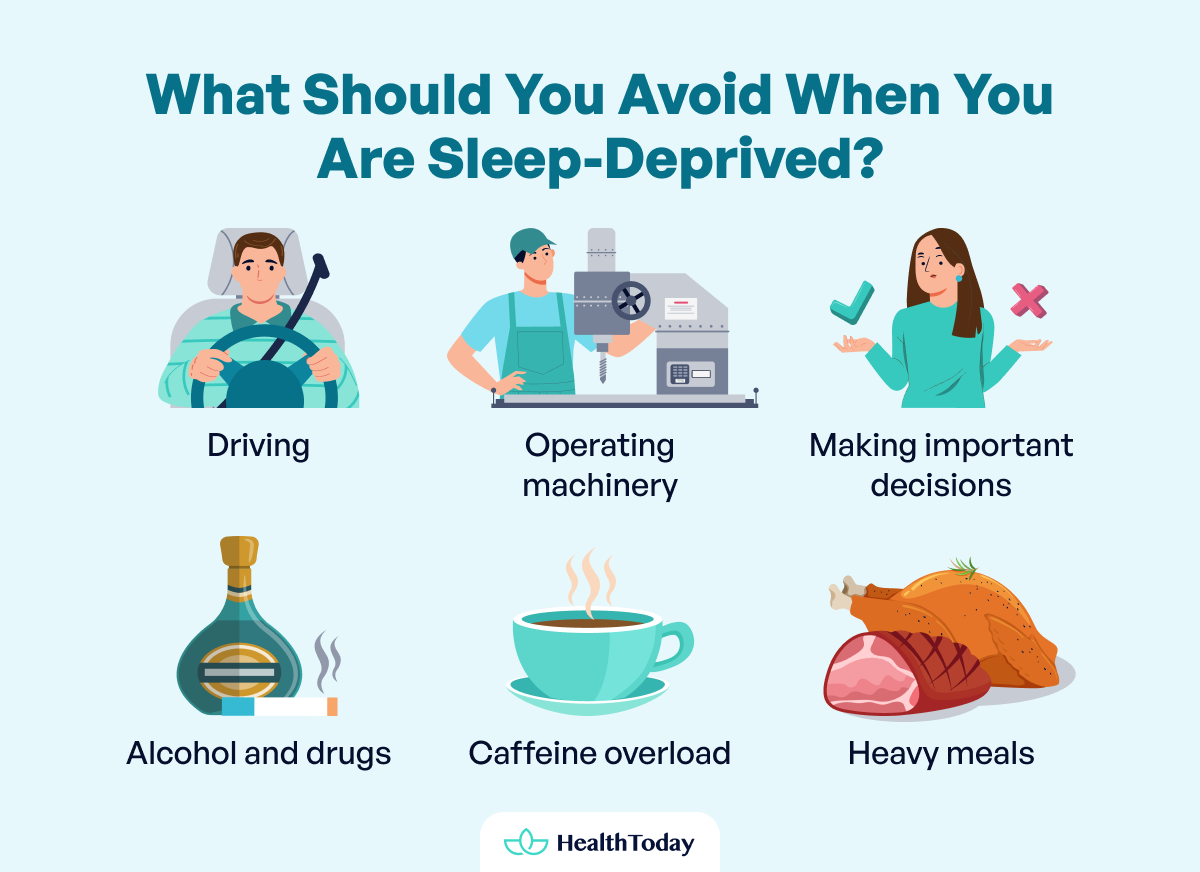

Driving
Drowsiness is a major risk factor for car accidents (41). Sleep loss slows your reaction time and dramatically increases the likelihood of microsleep episodes (brief, involuntary sleep lasting seconds) (42).
These factors put you and others at significant risk. If you’re sleep-deprived, opt for public transportation or a rideshare service.
Operating machinery
Heavy machinery, power tools, and simple lawnmower equipment require focus and coordination. Sleep deprivation impairs both, increasing the likelihood of accidents and injuries. It’s better to save these tasks until you’re well-rested and alert.
Making important decisions
Sleep deprivation clouds your judgment and makes it harder to think critically. Avoid making major decisions like financial investments, signing contracts, or having important conversations. Make these decisions when you’re thinking clearly.
Alcohol and drugs
Alcohol, nicotine, and cannabis are sometimes perceived as sleep aids. However, they can disrupt sleep when you’re already sleep-deprived (43). Alcohol may initially help you fall asleep. However, it disrupts later stages of sleep, preventing deep sleep cycles and causing daytime fatigue (43).
Nicotine acts as a stimulant and can make it harder to fall asleep and stay asleep. Cannabis use can lead to tolerance and withdrawal symptoms that worsen sleep problems in the long run (43). Avoiding these substances altogether can improve your sleep quality and help you feel more rested during the day.
Caffeine overload
A moderate amount of caffeine can provide a temporary alertness boost. However, relying on excessive caffeine when lacking sleep can lead to anxiety and jitters. It can also disrupt your sleep cycle further, hindering your ability to recover properly.
Heavy meals
A rich, heavy meal can make you feel sluggish and slow your digestive system. This can worsen feelings of fatigue and impair concentration. Opt for lighter, easily digestible meals that provide sustained energy without weighing you down.
To stay awake after an all-nighter, focus on light exposure, hydration, and a balanced diet. To recover from sleep deprivation, take a 10 to 20-minute nap, establish a regular sleep schedule, create a relaxing bedtime routine, and exercise.
Avoid driving, operating machinery, and making important decisions when you’re sleep-deprived. You can also hinder your recovery by consuming excessive caffeine, alcohol, drugs, or heavy meals.






How do some people cope with less sleep?
Most adults need seven to nine hours of sleep per night (44). However, some individuals seem to thrive on just six hours because of genetic predisposition and prioritizing sleep quality over quantity. These people who sleep less often feel energetic and alert despite not meeting the recommended sleep guidelines.
Here’s how some people function well with less sleep.
Genetic predisposition
Certain gene variants might influence sleep needs. Studies suggest some individuals may have a genetic predisposition for less sleep, allowing them to enter deeper sleep stages more efficiently (45).
Sleep quality over quantity
Both the total amount of sleep and the quality of sleep matter. However, studies suggest that sleep quality takes precedence (46). Sleepers who enter deep sleep quickly and experience minimal sleep disruptions might function well despite less sleep time (47).
Are people who sleep less truly healthy?
Research is ongoing, and some studies suggest there may be potential downsides to getting less than the recommended hours of sleep:
- Subtle deficits: Even if people who sleep less feel healthy, they might experience subtle cognitive impairments compared to those who get enough sleep (48). These deficits may be related to alertness and focus.
- Long-term health risks: Studies suggest a link between chronic short sleep and an increased risk of health problems like heart disease, diabetes, and obesity (8).






New findings
Recent research sheds light on how our daily habits can significantly impact our sleep. Here are some exciting breakthroughs and debunked myths that can help you optimize your sleep health.
Taking naps
Research now highlights the importance of the power nap (49, 50). These short naps, about 10 to 20 minutes, can improve alertness, cognitive function, and mood without interfering with nighttime sleep.
Power naps allow you to move through the lighter stages of sleep, promoting rejuvenation without entering deep sleep. Deep sleep stages are crucial for memory consolidation and physical restoration. However, abruptly waking from them can leave you feeling disoriented.
Screen time before bed disrupts sleep
Electronic devices emit blue light, which has a suppressive effect on the production of melatonin (51). When melatonin production is disrupted, it can take longer to fall asleep and the quality of your sleep can suffer.
Power down electronic devices at least an hour before bed to combat this. You can also opt for relaxing activities like reading or taking a warm bath to help your body wind down and prepare for sleep by allowing melatonin production to rise naturally.
Weekend catch-up sleep and a recovery from sleep deprivation
Research suggests that weekend sleep-ins can’t fully compensate for a sleep-deprived week (52). Chronic sleep deprivation can disrupt your circadian rhythm and affect your overall health.
Aim for a regular sleep schedule by going to bed and waking up around the same time each day, even on weekends. Consistency helps regulate your sleep patterns and promotes better sleep quality throughout the week.






Can lack of sleep cause euphoria?
Sleep deprivation is more likely to cause the opposite of euphoria. In fact, it can lead to irritability, anxiety, and mood swings.
Is it better to get one hour of sleep or no sleep?
Getting at least an hour of sleep is better than none, as it can provide some restorative benefits. A short period of sleep can improve cognitive function and mood.
Should I go to the hospital if I haven’t slept in two days?
Is sleep deprivation damage permanent?
Most of the negative effects of sleep deprivation are temporary and improve with adequate sleep.
However, chronic sleep deprivation can increase the risk of developing long-term health problems like heart disease, diabetes, cognitive problems, and obesity.
Does sleep deprivation cause ADHD?
Is it okay to sleep all day once in a while?
Occasional extended sleep can help recover from sleep debt, but consistent sleep hygiene is more beneficial.
Sleeping in occasionally can help mitigate the effects of sleep deprivation. However, maintaining a regular sleep schedule promotes long-term health and well-being.
Summary
In healthy adults, an occasional sleepless night is unlikely to be fatal. However, sleep deprivation can affect your physical and mental health and worsen existing health conditions like heart disease, diabetes, and anxiety.
Most of the negative effects of sleep deprivation, like irritability and a lack of focus, are temporary and improve with a good night’s sleep.
What are your experiences with sleep deprivation? How do you recover from a sleepless night, or how do you prioritize quality sleep in your daily routine? Share your tips and experiences in the comments below!








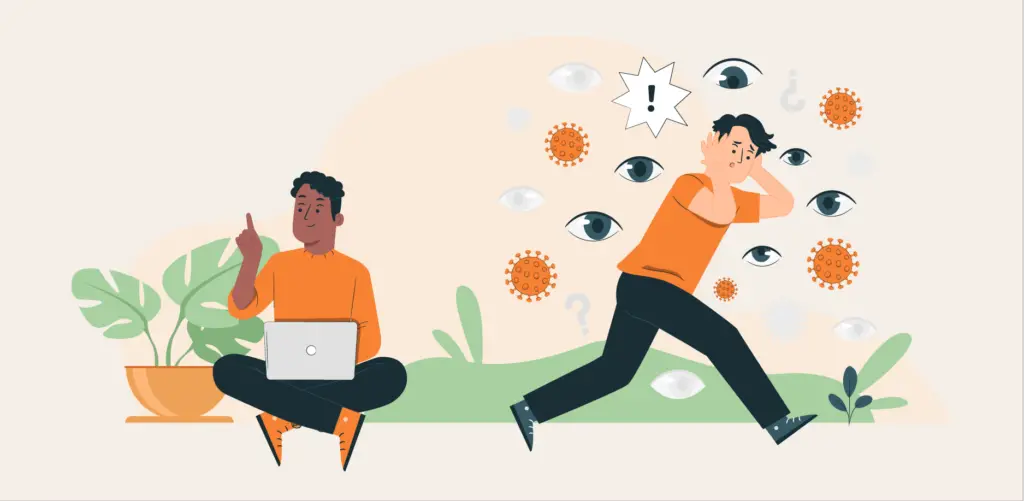

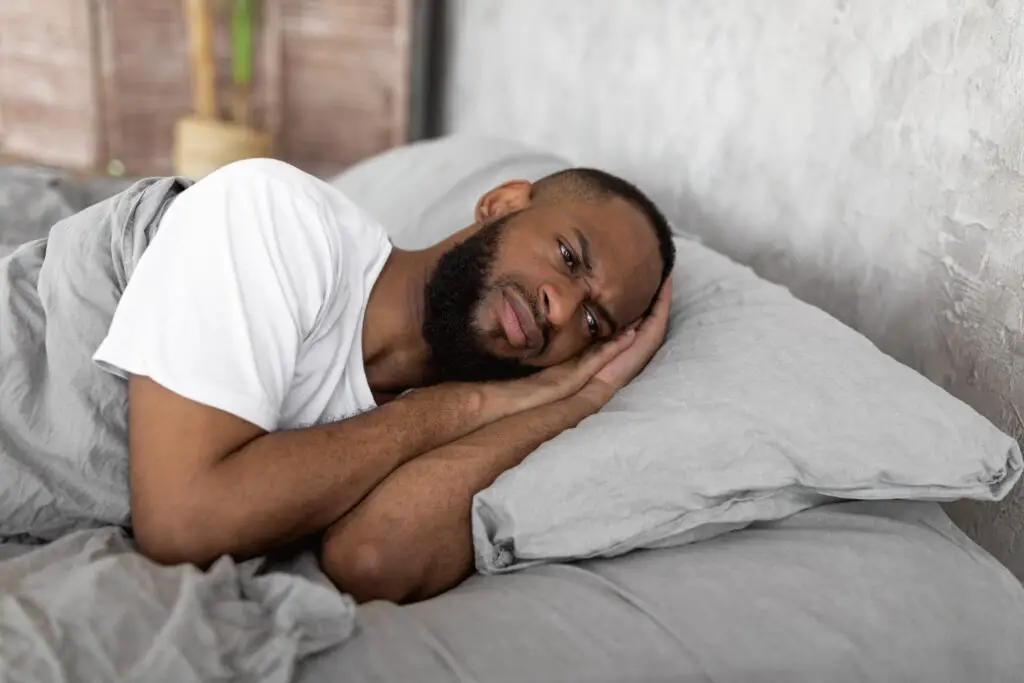






Comments
0